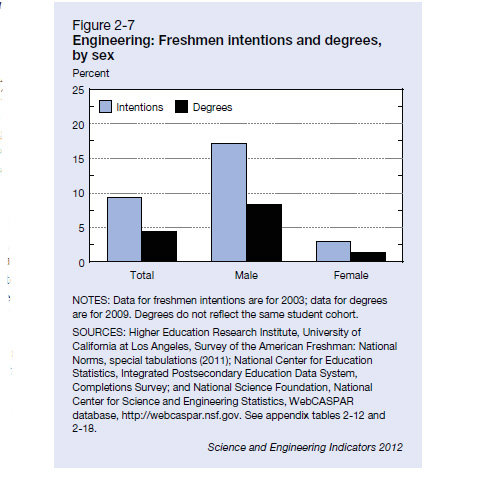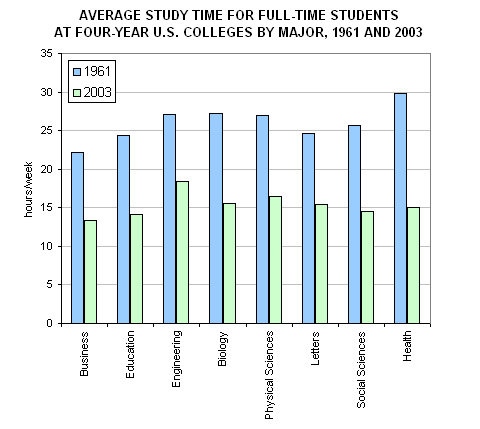
CATHERINE RAMPELL
Dollars to doughnuts.
Amid broader discussions about the future of the American work force, the National Science Foundation has just released a comprehensive report on the state of engineering and science in America. There’s a lot of meat in the report, but I found this chart to be particularly striking:

Perhaps swayed by statistics about the shortage (and correspondingly high wages) of engineers and scientists in the United States, in the last decade nearly one incoming freshman in 10 have said they expected to major in engineering. (Over all, about a third of incoming freshmen said they planned to major in any of the science and engineering fields.)
But the share who actually complete degrees in engineering has been about half that. Certain demographic groups planning to major in the natural sciences also had relatively high dropout rates.
What accounts for the high attrition rates? Maybe some of it has to do with aptitude, or encouragement, or good role models and mentors. But Philip Babcock, an economist at the University of California, Davis, suggests that a lot of it has to do with homework.
Professor Babcock has written extensively about college students’ evolving study habits (or lack thereof) over the last 50 years. He found that in 1961, full-time students spent about 40 hours each week in class and studying. By 2003, they were investing about 27 hours a week.
The time spent studying has fallen across the board, but especially in non-engineering majors:
 Source: Philip Babcock and Mindy Marks, “The Falling Time Cost of College: Evidence from Half a Century of Time Use Data.”
Source: Philip Babcock and Mindy Marks, “The Falling Time Cost of College: Evidence from Half a Century of Time Use Data.”
The typical engineering major today spends 18.5 hours per week studying. The typical social sciences major, by contrast, spends about 14.6 hours.
As my colleague Christopher Drew wrote in an article in November, STEM fields (science, technology, engineering, mathematics) have also had less grade inflation than the humanities and social sciences have in the last several decades. Given the study habits shown above, this probably isn’t surprising; courses with higher grading standards will often require students to study harder to get an A.
So maybe students intending to major in STEM fields are changing their minds because those curriculums require more work, or because they’re scared off by the lower grades, or a combination of the two. Either way, it’s sort of discouraging when you consider that these requirements are intimidating enough to persuade students to forgo the additional earnings they are likely to get as engineers.
There’s another way to read these findings, though. Perhaps the higher wages earned by engineers reflect not only what they learn but also which students are likely to choose those majors in the first place and stay with them.
Generally speaking, the students who study engineering are willing to work hard and abide by higher standards — traits that are useful in the labor market. Additionally, because these students worked harder in college, they also learned more, about engineering or any other subject. That would imply that humanities majors could have similar earnings potential if only they studied more, which may or may not be true.
Article source: http://feeds.nytimes.com/click.phdo?i=802754e66a7e7845a0dfc5df0957da74